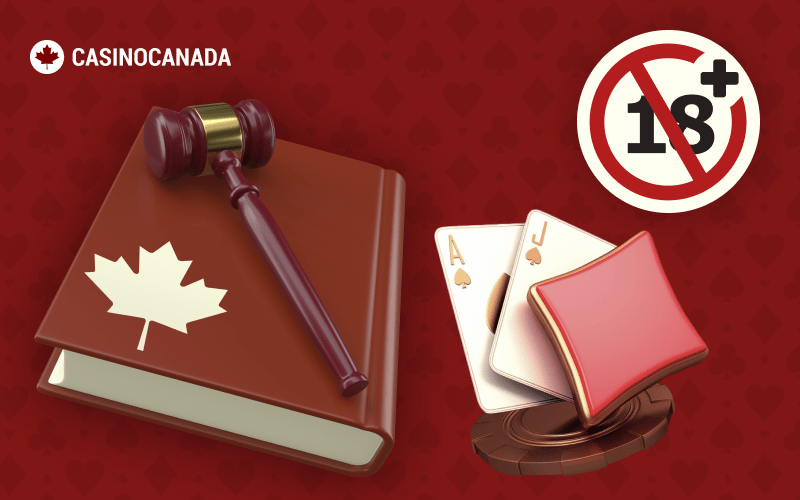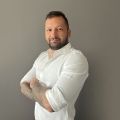Legal Gambling Age in Canada: Gambling laws in Ontario and other provinces

Canada’s gambling laws are unique, as regulations, including the legal gambling age, differ by province. Across most of the country, the casino age is set at 19, but in some provinces, gambling activities may already be accessible at 18. Read our comprehensive guide to get the complete picture of Canadian gambling laws regarding age.
Legal Gambling Age Requirements Across Canada
In Canada, to meet the legal threshold for gambling, the age varies – it's either 18 or 19. Each province in Canada can pass its legislation and create regulatory bodies to govern online and offline casinos, as well as enforce age restrictions. As a result, to gamble in Canada, residents and visitors must be either 18 or 19 years old, depending specifically on the province. We have compiled and listed the legal gambling age for each province below.
| 18 years of age | Alberta, Manitoba, Québec |
| 19 years of age | British Columbia, New Brunswick, Newfoundland and Labrador, Northwest Territories, Nova Scotia, Nunavut, Ontario, Prince Edward Island, Saskatchewan, Yukon |
Legal Status of Online Gambling in Canada

Without a country-wide law or central gambling authority, the regulation surrounding online casinos and sports betting sites varies across Canada. Although most provinces currently do not allow local online casinos to host their services there, it's allowed to play at legal online casinos with an international license, as long as players meet the provincial age criteria.
However, for those living in Ontario, British Columbia, Alberta, Manitoba, or Quebec there's a more favourable gambling landscape, as these regions have licensing agencies to ensure safe gambling. Residents of Ontario can even choose between state-run online gambling sites or offshore casinos, while the other provinces only have access to the former. Although most regions with only state-run casinos have only one localized casino operator, there's a guarantee of fairness and security.
Legal Online Gambling in Ontario
Ontario stands out as the province with the most online casino and sportsbook operators available in Canada. Since legalizing online gambling in April 2022, the region has become home to some of the best online casino Ontario options, welcoming over 70 online casinos and around 30 legal sportsbooks. The gambling age in Ontario is 19, but for lottery and bingo, the minimum age drops to 18.
All offline and online gambling activities are governed by the Alcohol and Gaming Commission of Ontario (AGCO). The organization is responsible for determining a suitable casino age limit, preventing underage gambling, and setting responsible gambling standards. iGaming Ontario (iGO) is also a key part of the regulatory landscape, handling the collaboration between the AGCO and the various private casinos.
Promising Online Gambling Laws in Alberta
Alberta is another part of Canada that presents a distinct example of regulating gambling platforms. Apart from setting age limits, the Alberta Gaming, Liquor, and Cannabis Commission requires gambling operators to contribute part of their earnings to charity. This way, residents who engage in any form of gambling get more than just entertainment for their money.
The province is also one of the few where the age for gambling is 18, resulting in a more inclusive gambling environment. Unfortunately, the province currently only has one online casino—Play Alberta—as private gambling platforms are yet to be legalized. Despite this, the lower gambling age requirements give Alberta good potential to become another hotspot of online gambling in Canada, if it were to allow more operators to enter the market.
How do Casinos in Canada Verify Your Age
Any legal casino is obligated to conduct Know Your Customer (KYC) procedures to comply with local regulations. The process requires new customers to submit documents proving their identity, age, and place of residence. This form of age verification is one of the standard gambling practices and is highly reliable.
-
Identity Verification
Because checking the authenticity of the submitted documents to verify your identity can take some time (up to several weeks if done manually), casinos allow users to complete verification after the account has already been registered. At best online casinos, this process usually doesn't take more than 24 hours. However, withdrawing winnings from a casino is still impossible without completing the KYC procedure. At land-based casinos in Canada, players may need to show two forms of identification, for example, a driver's license and a passport.
-
Geolocation Verification
Geolocation also plays a part in ensuring that players meet the legal age to gamble. Casinos typically use the customer’s IP address to determine their location and comply with the region’s legal requirements. For example, an international casino operating in Canada may allow 18-year-olds to play from Alberta but will ensure that those from British Columbia must be 19.
Taxes on Gambling Winnings in Canada
According to the Canada Revenue Agency, taxes are not applied to gambling winnings unless they qualify as income earned by a professional gambler. A gambler must be highly organized, have special knowledge or skills to reduce the element of chance, and regularly gamble with the intent to earn to qualify as a professional. In essence, most Canadians won't have their winnings taxed. An exception is an additional income generated from gambling winnings. For example, interest from investing your winnings will get taxed.
Responsible Gambling Practices in Canada
It is the moral obligation of all authoritative gambling resources to implement incentives promoting responsible gambling. As such, our team has made a responsible gambling guide and compiled a list of resources to help our readers.
We encourage all players to use our guide and check the legal gambling age in their province or territory before joining a casino.
| Resource | About | Contact Information |
|---|---|---|
| Gamblers Anonymous | A fellowship for people struggling with compulsive gambling. Recovery is encouraged via sharing experiences. | +1 (909) 931-9056 |
| Responsible Gambling Council | A non-profit aiming to prevent problem gambling. | +1 (416) 499-9800 |
| Self-exclusion | A voluntary commitment program to forbid players from gambling in online and land casinos. | Check this site for where to self-exclude depending on the province. |
FAQ
Is It true that online gambling Is illegal in Canada?
Although some sources say that online gambling is illegal in Canada, this is functionally not the case, as Canadian residents can play at international casinos without any legal repercussions, and several provinces have officially licensed online casinos.
What are the gambling age requirements in Canada?
In most Canadian provinces players must be at least 19 years old to participate in gambling activities. However, in a few provinces the legal gambling age is 18. The player's age is checked by verifying one's identity. In online casinos, this process is called Know Your Customer (KYC).
What is the minimum age to gamble in Ontario?
The minimum gambling age in online and land-based casinos regulated in Ontario, similar to most of Canada, is 19. This age limit applies to casinos, sports betting, and poker. The exceptions are lottery and bingo games. Ontarian citizens can participate in these forms of gambling from the age of 18.
How can I gamble if I am only 18?
Although you would not be able to play at any casino in Ontario, you could still get into the world of gambling with something like the Ontario 49 or the Atlantic 49 (Atlantic Lottery) in other provinces. Furthermore, Manitoba, Alberta, and Quebec set the age requirements for all forms of gambling at 18.
Who regulates gambling in Canada?
Each province in Canada can determine its own gambling rules. Canadian gambling regulation is handled at the provincial level by government agencies. For example, in Ontario gambling is regulated by the AGCO (Alcohol and Gaming Commission of Ontario) or in Alberta – by the AGLCC (Alberta Gaming, Liquor and Cannabis Commission).
Can Canadians play at offshore online casinos?
Yes. Canada has no laws prohibiting citizens from engaging with any international casinos. As long as the casino’s license terms do not prevent it from accepting Canadian players, they can join it. Keep in mind that the age limits in each province still apply for players choosing to play at overseas casinos.
How can Canadians withdraw winnings from an international casino?
Before withdrawing funds from an online casino, you must provide documentation proving your identity and place of residence. Provided the casino officially accepts Canadian Players and the KYC process has been completed, the withdrawal process should be straightforward. Do note that residents of Canada may still need to pay taxes on such winnings if they can be qualified as professional gamblers.















